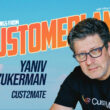Companies like to talk about being customer centric (customer experience). The trouble is, the majority are doing more talking than listening. If you look at the most successful companies right now — Amazon, Instacart, Netflix — they’re successful in large part because they’re great listeners.
By Aaron Raddon
Consider Instacart, which has seen its order volume increase 500% over the last year. When you open the Instacart app, you’re not thinking about the relationship you have with the company. You’re focused on what’s missing in your refrigerator and pantry, what kind of foods your family is eating, what you’re going to be making for dinner over the next five days, and so on. Yes, in a sense, you’re being selfish. But, more importantly to Instacart, you’re telling it about yourself and your preferences. Companies that are truly customer centric aren’t thinking about what they’ll say next to their customers. They’re actively listening for what their customers want and responding to those needs.
For sure there is an element of “right place, right time” to Instacart’s success, but it’s more than that. Instead of creating customer experiences that put it in the driver’s seat, Instacart is focused on putting its customers in the driver’s seat. In its case, that means making it easier for customers to choose their preferred food and get it easily rather than focusing on things like customer segmentation or cross-selling. Every single brand that is successful right now is either benefitting from a pandemic push in sales and/or embracing this concept of customer control.
Customer Centricity Means Customers Are in Control
Letting customers take control is an unnerving model for most marketers. They’re used to pushing out messaging, emails and campaigns based on what they know about their customers (and what they want to promote), which oftentimes is little more than demographic data. But letting customers make decisions for themselves is the core of customer centricity. As a marketer, you don’t know what’s best for your customers, and it’s arrogant to think otherwise. Your role is to make it easier for customers to control their journey, listen to the decisions they make, and let those decisions drive the next best experience through customized product or content recommendations that show you’ve been listening.
YouTube does this very well. Every video you watch on YouTube informs every video recommendation that follows. Watch a nature video on squirrels, and the next time you log on to YouTube your welcome screen will feature squirrel videos. Watch a video on big bands of the 1940s and YouTube might recommend a music video by the Squirrel Nut Zippers. It’s more or less the same with Netflix and Spotify. Even Instacart serves up unique product recommendations based on your previous order.
Customers not only enjoy this kind of personalized experience, they expect it. If an action that a customer takes doesn’t impact their next experience, they’re going to figure out pretty soon that you’re not listening to them. This kind of active listening means actually listening for new customer behavior and being informed by what you hear, even if it’s saying something different than what your own voice of experience has been telling you for years.
I’ve used Instacart and Spotify as examples, but this new marketing model doesn’t just apply to apps. If customers click on a marketing email, it should alter their next interaction with your brand. If they read a piece of content, it should alter the next piece of content you recommend for them. Like a science fiction time-travel movie, every action should have consequences for the future.
Where Does This Leave Marketers?
So, if customers are driving the customer journey, do marketers need to take a back seat? Not by any means. Listening to customers through their data allows marketers to better shape customer journeys by creating a portfolio of content, offers, services or even products that are more relevant to their customers. In our own experience, we’ve seen that the best-performing marketers are those who have retooled their content production process based on what they’re hearing from their customers.
The good news for marketers is it’s never too late to listen. New technology such as recommendation engines make it easier than ever for companies to hand their customers the keys to their own personal journey, listen to what they’re saying, and use those insights to give customers exactly what they want through automated recommendations. It’s still a data-driven marketing model, but one that puts the customer in the driver’s seat. This kind of customer-centric thinking isn’t just what’s next in marketing. It’s about doing what’s next, and what’s next after that, etc. to deliver one-to-one marketing on a scale of millions.
One thing that hasn’t changed about marketing in the last few decades is the mantra that “the customer is always right.” It’s only in the last few years, however, that we’ve been able to see how right they are, especially when it comes to making the right choices about what they want.
Aaron Raddon is the co-founder and CTO of Lytics and has spent his entire career working to transform data into decisions. Aaron co-founded Lytics with James McDermott in 2012 after discovering a real need in the marketplace for bridging the gap between data and action.
This article originally appeared on CMSWire. Photo by Charles Deluvio on Unsplash.













8 comments